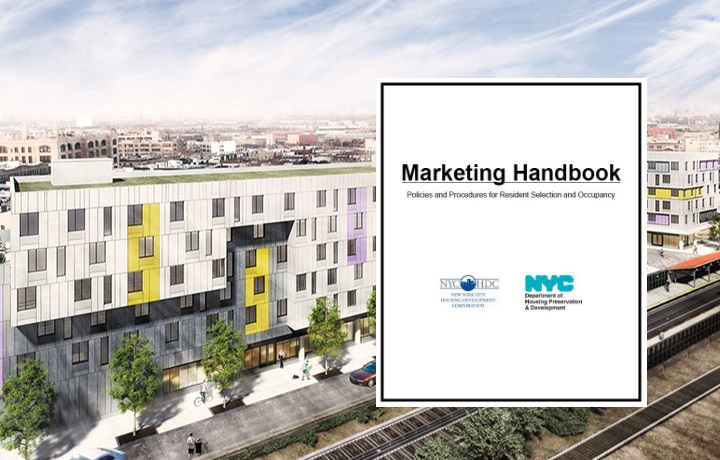
HPDNYC
Artist's rendering of a new affordable development called Van Sinderen Plaza. HPD's Marketing Handbook, inset, tells affordable housing developers how to implement policies like community preference.
A federal lawsuit challenging New York City’s practice of setting aside affordable apartments for nearby residents is still alive after a judge on Monday rejected a bid by the de Blasio administration to have the case dismissed.
In an action brought by the Anti-Discrimination Center, three Black New Yorkers say they have entered lotteries for affordable apartments but not been selected, and that they plan to enter future lotteries for other affordable apartments. In both the past and future cases, they claim, the “community preference” policy stands as a barrier to their getting a fair shot at housing.
That policy, begun under Mayor Koch and expanded under Mayor Bloomberg, sets aside 50 percent of apartments in new affordable housing developments for residents of the local community board.
The lawsuit claims the policy perpetuates residential segregation in New York by giving residents of segregated neighborhoods a better chance to win the lotteries, reducing the odds that outsiders might come in to diversify the community. (Key background on the case is here.)
Supporters of the policy counters that it is a bulwark against displacement. The community preference policy also plays a crucial political role in making sure that neighborhoods where new housing is built benefit directly from it—a key selling point for rezonings and other steps that make neighborhoods more dense.
Monday’s ruling (which can be read here) didn’t address the strength of evidence in the case; instead, it analyzed whether the logic of the lawsuit gave the plaintiffs standing to sue and presented a plausible claim. The de Blasio administration has argued that it does neither, in part because the lotteries where the plaintiffs have struck out in the past were governed by a state policy, not the city one.
But the judge ruled the possibility of future discrimination in subsequent housing lotteries gave the plaintiffs the right to make their case.
The next scheduled action in the case is a pre-trial conference in early December.
City Limits’ coverage of housing and development is supported by the Charles H. Revson Foundation and the New York Community Trust.








4 thoughts on “Suit Against City Affordable Housing Policy Survives”
Another reason why deBlasio’s affordable housing plan is going nowhere.
And then there’s this –
http://therealdeal.com/2016/10/21/city-could-require-developers-to-reserve-units-for-the-homeless/
THE ENTIRE “AFFORDABLE HOUSING” ISSUE IS BOGUS.
IT EXCLUDES PEOPLE WITH LOW INCOMES FROM ENTERING THE LOTTERY. A PERSON EARNING $20,000 CAN EASILY PAY $700 A MONTH YET THESE PEOPLE ARE PRECLUDING FROM AFFORDABLE HOUSING.
Affordable Housing and the City of New York were all in the plan to selectively hand pick their own preferred practice in placement. I recently came up on the lottery for 250 Ashland Place, Bklyn, a luxurious development in the heart of my childhood neighborhood. However, after 3 years in shelter and numerous reform efforts, the City met with another discriminatory practice against me that criminalize being homeless. To date, the City of New York, DHS and HPD along with the non-profits are engaged in the practice. Over the insistence, the City are enforcing the community preference policy by refusing to assist me in assuring placement in the unit at 250 Ashland Place, with a legitimate SEPS voucher, that I feel is behind the reason for it. A Criminal Justice major with aspirations, I am being denied an equal opportunity as I am sure are many others.
I read somewhere recently a discussion about the $15 minimum wage. They projected that an average NYC rental would require two workers be paid not $15 per hour each but $16 per hour to afford that rent.
They did not say two people paid at $15 should not be signing any leases.